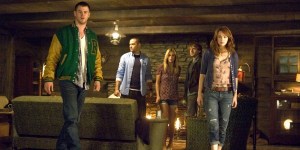 Lee Hirsch’s documentary Bully is often painful to watch, so ably does it capture the torment some kids endure on a daily basis, as well as the aftereffects. Already much-discussed due to the distracting controversy stirred by the initial R rating slapped on it by the MPAA, it is a work of uncommon power.
Lee Hirsch’s documentary Bully is often painful to watch, so ably does it capture the torment some kids endure on a daily basis, as well as the aftereffects. Already much-discussed due to the distracting controversy stirred by the initial R rating slapped on it by the MPAA, it is a work of uncommon power.
The film follows three bullied youths through the 2009-2010 school year: Alex is an awkward 12-year-old in Sioux City, Iowa, and an easy target for the kids who call him “Fish Face” and pummel him on the school bus on a daily basis; 16-year-old Kelby had the misfortune of being a lesbian in tuttle Oklahoma, where even teachers singled her out for mockery and lifelong friends of the family turned their backs on them; 14-year-old Ja’Meya is an African-American honors student from Yazoo County, Mississippi, who was so desperate to stop the bullying she threatened a busload of classmates with a gun, landing her in juvenile hall and later a psychiatric hospital.
Even more harrowing are the experiences of two families also featured: David and Tina Long of Murray County, Georgia, lost their 17-year-old son when he was bullied to the point where hanged himself in his closet; the son Kirk and Laura Smalley of Oklahoma shot himself at age 11 for the same reason. Both families become fierce anti-bullying advocates, confronting apathetic and clueless administrators who seem alarmingly indifferent to what is going on in schools. The phrase “boys will be boys” is bandied about so often that it becomes nauseating to hear.
Hirsch places much of the blame upon said school officials, with fly on the wall perspective during incidents where they place blame upon the victim, offer empty solutions to parents and kids, or are just completely clueless; he combines those instances with ones of a 12-year-old serving as a pallbearer at his best friend’s funeral, of a teen admitting to three suicide attempts, of a parent reminding us that his son “will be 11 years old forever”.
Like all films, Bully has it weak points: the bullies themselves and their families are never interviewed, and cyber-bullying is never addressed. Nevertheless, Hirsch has constructed a stirring, heartbreaking piece of advocacy filmmaking, one that will hopefully serve as a wake-up call to parents, educators, and students, all of whom should consider it required viewing.
[youtube]http://www.youtube.com/watch?v=W1g9RV9OKhg[/youtube] Hyped as the new Evil Dead; it’s more accurate to call The Cabin in the Woods the new Scream. A gleefully anarchic horror comedy by Joss Whedon and Drew Goddard (co-writers, producer, and director — in that order), it sets up a horror movie scenario we’ve seen a thousand times before, pokes numerous holes in it, and then gives the whole shebang a good pantsing in the final act.
Hyped as the new Evil Dead; it’s more accurate to call The Cabin in the Woods the new Scream. A gleefully anarchic horror comedy by Joss Whedon and Drew Goddard (co-writers, producer, and director — in that order), it sets up a horror movie scenario we’ve seen a thousand times before, pokes numerous holes in it, and then gives the whole shebang a good pantsing in the final act.
The plot (or as much as can be revealed here with a massive spoiler spill) is thus: A group of five college kids — Curt the jock (Chris Hemsworth, pre-Thor), his girlfriend Jules (Anna Hutchinson), stoner Marty (Fran Kranz), good girl Dana (Kristen Connolly), and brainy nice guy Holden (Jesse Williams), head out to an isolated cabin in the woods for a nice weekend’s debauch. Little do they know that the area is contained and controlled by a group of scientists and engineers lead by Bradley Whitford and Richard Jenkins, for sinister and shadowy purposes. As soon as night falls, the kids are attacked and picked off one at a time by zombie rednecks.
There’s actually much more to it than that, none of which can be revealed without giving away the various plot twists, and The Cabin in the Woods is a movie whose plot twists with clockwork precision.
Whedon and Goddard are smart filmamkers, and they go out of their way to send up as many horror movie cliches as they can in 95 minutes, while paying homage to their sources. They stock the movie with the usual stereotypical horny college kids who make stupid counter-intuitive decisions that lead to their meeting brutal ends via items gardening tools, then shrewdly drag them into uncharted territory.
The kids are ultimately just the side story, however; it’s the behind-the-scenes machinations of Whitford and his cabal that peak our curiosity while generating the movie’s wink-wink, nudge-nudge digs at all things horror movie-related, like some sort of deranged Greek chorus. Thankfully they do so without soaking us in sarcasm.
Ironically, The Cabin in the Woods may disappoint some hardcore horror geeks. It has its share of gore and hideous monsters, but ultimately it’s a movie about horror movies as opposed to horror, and as such it’s not particularly scary. Whether or not it counts as subversive is a matter of taste.
[youtube]http://www.youtube.com/watch?v=cQWnPVOSZKg[/youtube]




